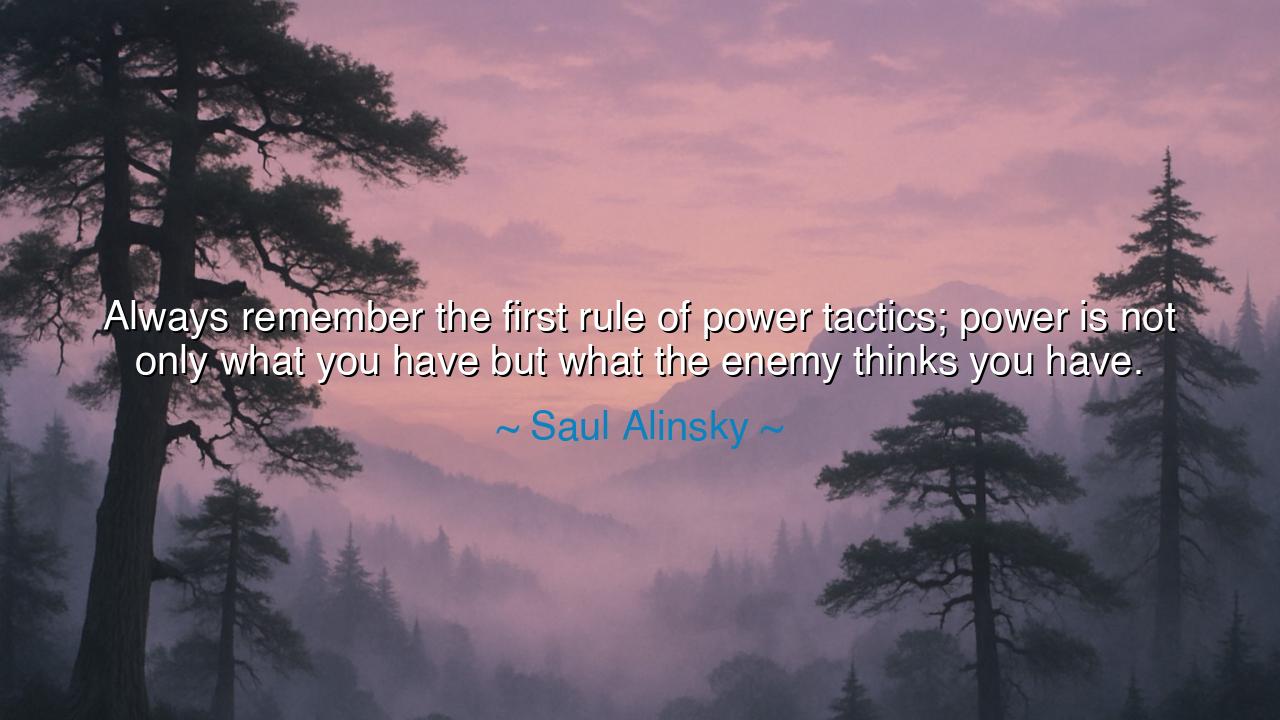
Always remember the first rule of power tactics; power is not
Always remember the first rule of power tactics; power is not only what you have but what the enemy thinks you have.






In these shrewd and penetrating words, Saul Alinsky speaks to the enduring nature of power and the subtle art of perception. He warns that true power is not measured solely by what one possesses, but by what the enemy thinks one possesses. In this, he reveals a timeless truth: influence extends beyond tangible resources and resides in the mind of others. The perception of strength can command respect, deter opposition, and shape outcomes, often more effectively than strength itself.
The origin of this insight lies in the study of human interaction and strategy, stretching back to the earliest treatises on war and governance. From the teachings of Sun Tzu in The Art of War to Machiavelli’s writings on statecraft, the idea that perception can outweigh reality has guided leaders and tacticians for centuries. Alinsky adapts this principle to modern activism and social organization, showing that understanding the mind of the opponent is as crucial as wielding actual resources. Power, he teaches, is as much about psychology as it is about material control.
History provides striking illustrations of this rule in action. Consider Hannibal, the Carthaginian general, whose reputation for audacity struck fear into Rome long before he ever crossed the Alps. Rome perceived him as a nearly invincible force, and this perception influenced their strategy and morale. Hannibal’s actual power—while formidable—was amplified exponentially by the fear and respect he inspired. Alinsky’s wisdom is echoed in such moments: the mind of the adversary is a battlefield where perception can triumph over reality.
The principle also resonates in political arenas. During the Cold War, the United States and the Soviet Union projected military strength and nuclear capability, sometimes inflating perceptions to secure strategic advantage. The true measure of deterrence lay not only in arsenals but in what each believed about the other’s willingness and capacity to act. Perception, carefully managed, became a tool of survival and influence, demonstrating Alinsky’s first rule in practice.
Ultimately, this quote teaches a profound lesson about strategy, foresight, and psychological mastery. Alinsky reminds future generations that the essence of power lies not only in possession but in the projection of strength, the crafting of appearances, and the manipulation of belief. Let this teaching endure: to wield power wisely is to understand the human mind, to shape perception, and to recognize that influence is as much an art of the imagination as it is a function of tangible might.






TLNguyen Thuy Linh
This quote exposes a harsh truth about human nature: power often exists in the mind more than in reality. It makes me think about how media, politics, and even workplace hierarchies operate. People tend to respect or fear what they think is powerful. But that also raises a concern—if perception creates power, doesn’t that make society vulnerable to manipulation and illusion?
NATien Ngoc Anh
What strikes me here is the emphasis on strategy over brute force. It’s almost like a chess game—knowing how to make others overestimate you can be more effective than actually having power. Yet I question whether that’s a form of wisdom or deception. Is effective leadership about managing perception, or should it be about transparency and authenticity instead?
PDNguyen Pham Phuong Dung
This idea makes me think about how fear and uncertainty are often used as tools of control. If people believe you have power, they’ll act accordingly, even if your actual capacity is limited. It’s a bit Machiavellian, but also true in real-world strategy. Still, I wonder—can such tactics coexist with ethics, or does the manipulation of perception always come at a moral cost?
LNLe Nhu
I find this statement both clever and a bit unsettling. It reminds me of how politics, business, and even personal relationships often rely on image management. Power isn’t just about resources—it’s about confidence, reputation, and manipulation of perception. But I can’t help but question, is that sustainable? Or does it turn leadership into a performance rather than genuine influence?
PLNguyen Ngoc Phuong Linh
This quote really highlights how much of power is psychological. It’s fascinating to think that perception can sometimes outweigh reality. If others believe you’re strong or influential, that belief alone can shape outcomes. But it makes me wonder—does relying on perceived power rather than real strength create instability in the long run? What happens when the illusion fades?